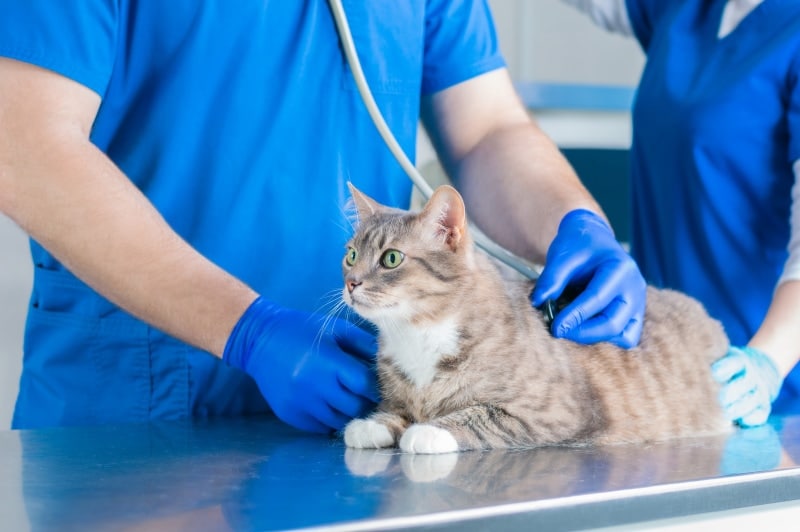Here’s a very good question that was posed by Sally not long ago in the comments section of one of my articles:
My cat Rosie had hyperthyroidism and was successfully treated with radioactive iodine last year. She went to the vet school hospital for the treatment, and they noted that she had an enlarged heart, thought to be a result of the hyperthyroidism. Now her thyroid levels are normal, and my vet says her heart sounds great when he listens to it at her checkups. But would he be able to tell just by listening whether her heart has returned to a normal healthy state? Or should we ask him about following up on the cardiomyopathy? If it matters, the hyperthyroidism was just found with routine blood work at her 9-year-old checkup. She had only lost a little weight at the time and was really more playful than ever. Thanks!

Hyperthyroidism is a very common in middle-aged and older cats. It is a condition of the thyroid gland, in which the gland becomes overactive and produces excessive amounts of its eponymous hormone. Symptoms of hyperthyroidism include increased thirst and appetite, weight loss, a rough coat, agitation and vocalization (especially at night), and chronic diarrhea. Hyperthyroidism may cause kidney damage. It also can cause high blood pressure, a high heart rate, and a heart condition called thryotoxic heart disease.
There are several ways to treat hyperthyroidism, but the best one in my experience is radioiodine therapy. Although the treatment sounds scary, it is actually quite straightforward and noninvasive. The affected cat receives an injection of a special isotope of iodine that reduces the thyroid gland’s activity. Most cats treated in this fashion are permanently cured, although they must be hospitalized for a few days while the iodine clears from their system. Note that most experts recommend starting a cat on medical management with methimazole for a period of time before commencing radioiodine therapy.

Thyrotoxic heart disease is usually progressive, but treatment with radioiodine should halt this progression. Furthermore, some effects of thyrotoxic heart disease may be reversible after radioiodine treatment, especially when it is caught early.
However, thyrotoxic heart disease is not always completely reversible. And it is important to remember that thyrotoxic heart disease and hypertrophic cardiomyopathy, another common type of heart condition in cats, are not mutually exclusive.
Cardiomyopathy, in particular, does not consistently cause a heart murmur or any other changes that can be detected simply by listening to the heart. Sally, without diagnostic imaging it is not possible to say whether your cat’s previous heart enlargement represents an ongoing problem.

However, with diagnostic imaging such as ultrasonography of the heart (known as echocardiography), a medical professional should be able to rapidly determine the status of your cat’s heart. I strongly recommend that you follow up with a veterinary radiologist or cardiologist to take this step. I hope the test shows nothing wrong.
Featured Image Credit: Andy Gin, Shutterstock





